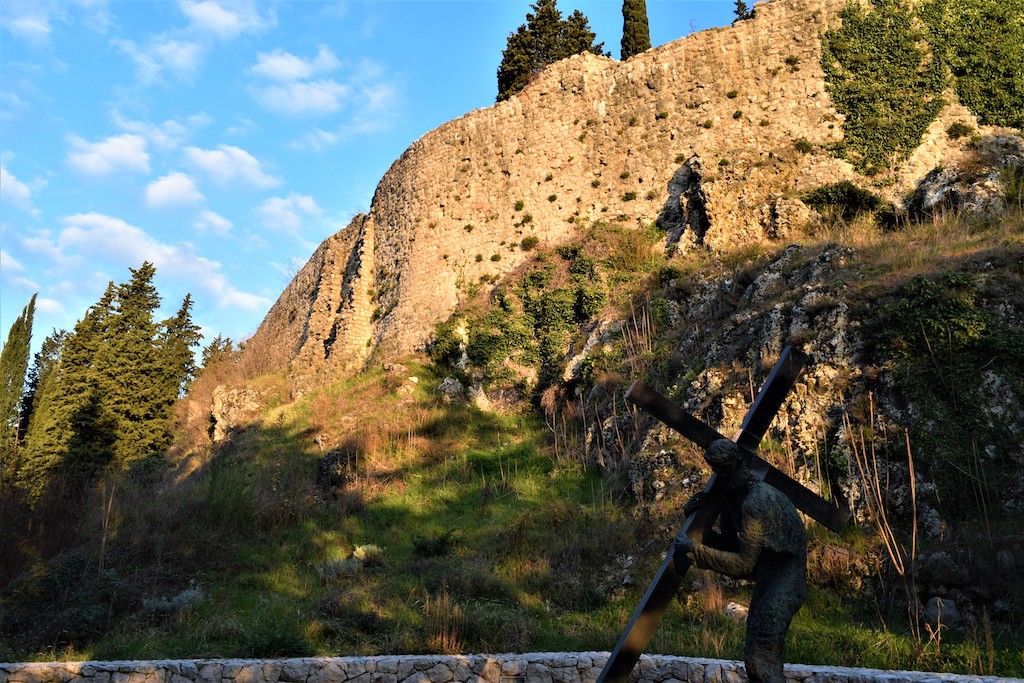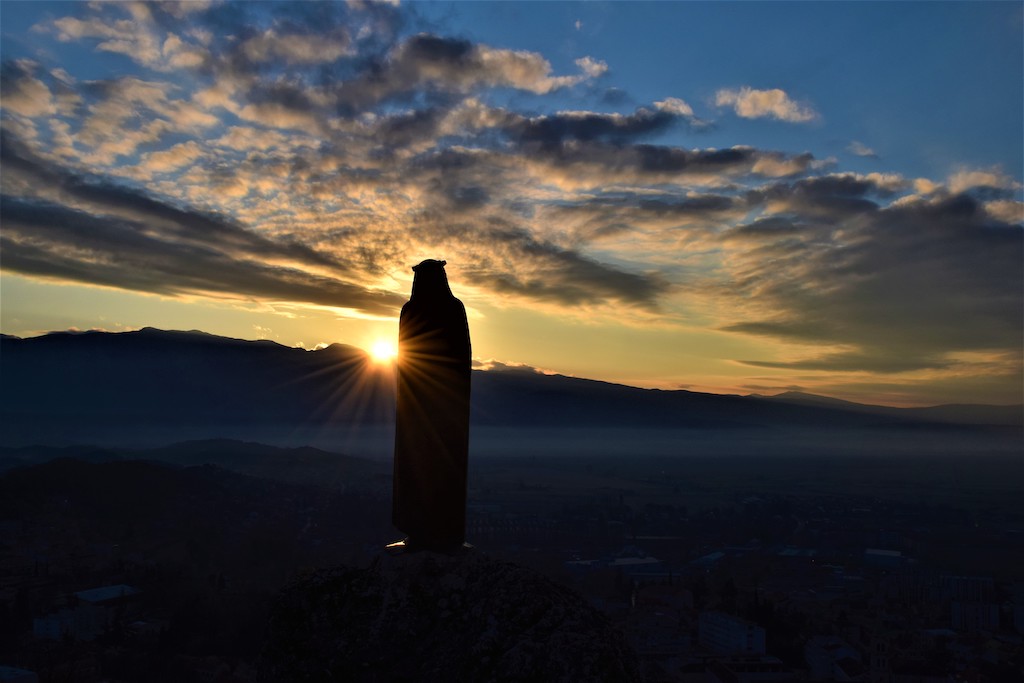Will Croatian EU Membership Help it Recover from Crisis More Easily?
As Adriano Milovan/Novac writes on the 8th of April, 2020, rather surprisingly, the Republic of Croatia is among the more resilient countries and economies in terms of risks and shocks, the research of insurance company FM Global shows. Could Croatian EU membership also help it to emerge from various forms of crisis more easily?
According to the survey, which included 130 countries worldwide, the Croatian economy ranked 37th in the world in terms of resistance to shocks. According to the calculations of FM Global experts, Croatia is even better ranked than Slovenia, which is ranked 42nd in terms of economic resilience, and is slightly lower than Hungary, which ranked 35th. The Croatian economy, according to the research, is more resistant to shocks than the economy of neighbouring Serbia, which is ranked 63rd, or the economy of another neighbour - Bosnia and Herzegovina, which is ranked a concerning 70th. Croatia also ranked better than Bulgaria, which ranked 45th, and Romania, which has been ranked 36th, is slightly better than us in this survey.
FM Global's research refers more specifically to last year, and it analyses various forms of risk for individual national economies - from political, to economic to natural risks. This insurance company, they say, is primarily a tool that should help the management of companies in making business decisions, including investments.
The study, therefore, doesn't directly address the resilience of world economies to the impact of the current unprecedented coronavirus pandemic. However, as the international media and Croatian analysts point out, the report could also look into the recovery dynamics of the Croatian economy once the coronavirus crisis has ended.
Of course, there are a lot of question marks throughout the story, given that this is a shock that the world, and one that even the historically unlucky Croatia has not yet encountered. Questions have been raised as to how long the coronavirus-induced crisis will last, as well as what its consequences could be. But, the economists Novac spoke with hope that Croatia will still emerge from the coronavirus recession more quickly than it did during last recession, in which the country spent six very long years. The reason is simple: Croatian EU membership, a badge which gives it the opportunity to make greater use of money from European Union funds, and makes it subject to the rules of conduct of the Union.
''Today, Croatia is in a different situation than it was in back in 2008 and 2009. The EU has forced the government to stabilise public finances, and much has been done in this regard, with interest rates lower today than at the beginning of the last crisis. In addition, this time, the government reacted swiftly and adopted packages of measures for businesses. Therefore, the chances of a faster recovery today are certainly higher than they were during the last crisism'' says Damir Novotny, a reputable economic analyst.
He added that Croatian EU membership is particularly important here, which certainly strengthens the overall resilience of the Croatian economy. Because of all this, Novotny believes, the prospects for the recovery of the Croatian economy are much better today than they were when the last recession hit the country.
This does not mean, however, that once the coronavirus crisis is over, that recovery will go smoothly and quickly. For starters, Croatia depends very much on tourism, and this year's tourist season can already be considered lost. This means that tourism recovery, which generates a fifth of Croatia's gross domestic product (GDP), can only be expected next year. Furthermore, Novotny warned, Croatia has also entered a new crisis with the same problem as in the last recession - the country's infamous, draconian, cumbersome, inefficient and ubiquitous public sector.
He therefore proposes that Croatia does what the Baltic countries did at the beginning of last recession, and embark on rapid public sector reform. This, he noted, would open up space for the private sector, which would make it easier to get access to the money needed and speed up the recovery of the Croatian economy.
Macroeconomist Goran Šaravanja also believes that Croatia's recovery from the crisis could be much quicker than it was in the last recession. He sees the biggest asset to that precisely in Croatian EU membership.
''Croatia's risk perception is lower today. You can see that when we compare ourselves with countries not yet in the EU, like Serbia and Bosnia and Herzegovina: they're not yet under the EU umbrella and don't have access to such large EU funds as we do, nor are they part of the common market, so, they're riskier,'' explained Šaravanja.
In addition, he added, both the Croatian state, companies, and the population have been quite dilapidated in recent years, making the situation a little easier. In addition, in the past crisis, Croatia entered a double deficit - in the current account of the balance of payments and in the state budget, and this situation has changed in recent years.
"All this will make it easier for Croatia to recover, which, without these mechanisms, would be much harder and much slower," concluded Šaravanja, adding that despite that, the country's recovery will not go either quickly or easily.
Otherwise, according to the Resilience Index, Norway, which is not an EU member state but does hold membership of the EEA has the highest resistance to risks and shocks, and Denmark is the strongest among EU member states. On the other hand, the least resilience among the countries covered by the survey was demonstrated by Haiti, coming in an unimpressive 130th place. Compared to 2018, Rwanda has experienced the biggest leap on the ladder, and Northern Macedonia has seen the biggest drop, a survey shows.
Follow our politics and business sections for more on Croatian EU membership and its effects on business.
Have Government Coronavirus Measures Forgotten About Marinas?
Nautical tourism in Croatia is one of the areas of the country's strongest economic branch which was blossoming before the coronavirus crisis struck. Croatian marinas are a money pot at the best of times, and tourism based precisely on the soft waves of the sparkling Adriatic sea could be a gold mine. That being said, has the Croatian Government forgotten about marinas in their package of anti-epidemic economic measures?
As Marija Crnjak/Poslovni Dnevnik writes on the 9th of April, 2020, after addressing the public a few days ago warning that the Croatian Government had forgotten them in their package of measures to help the economy and the tourism sector due to the effects of the pandemic, Croatian marinas also sent an official letter to the competent ministries and the government itself in order to attempt to halt the collapse of the sector in time for the upcoming season.
Despite the fact that many are claiming that 2020's tourist season is a no go, given the unprecedented circumstances we find ourselves in, Croatian marinas still believe this summer could attract tourists who have their hearts set on nautical tourism in Croatia.
''It's very urgent for us that they recognise the marina system that employs around 2500 people, and the specifics of the sector that mean that we're currently not eligible for the state's minimum wage support. As a rule, marinas are in operation since April the 1st, so we have no evidence that revenue has fallen previously because we were closed,'' explained Sean Lisjak, president of the Association of Marinas at the Croatian Chamber of Commerce (HGK)
During this period, Croatian marinas also started to pay for services from charter companies, and since everything in Croatian tourism has now come to a halt, they aren't in a position to pay for those services, nor are they entitled to state support.
The pressure is increasing, and some marinas have unfortunately begun to send foreclosures to charter companies, Lisjak states. Another problem they're facing is the concession for the use of the maritime domain, which they paid for this year back in February, before the onset of the coronavirus crisis.
''We're seeking for the state to equalise us with the rest of the tourism sector through a measure of release from having to make the concession payment, and the release of the concession payment for 2021. In addition, in the long run, we're seeking equalisation through tax treatment and the lowering of value-added tax rate on marina services to thirteen percent,'' concluded Lisjak on behalf of the Marina Association at the Croatian Chamber of Commerce.
For more on coronavirus in Croatia, follow our dedicated section.
Croatian Scientist Ivan Đikić Claims Croatia is in "Most Dangerous" Phase
As Poslovni Dnevnik writes on the 8th of April, 2020, respected and reputable Croatian scientist at Goethe University in Frankfurt, Ivan Đikić, discussed everything you need to know about the coronavirus epidemic with N1.
A few days ago, the Croatian scientist warned the public about what they should do in the ongoing coronavirus crisis in order to continue the excellent results Croatia has been seeing in the fight against the pandemic when compared to very many other countries.
Commenting on how policies are responding to the challenges of the coronavirus epidemic, Đikić said that it is paramount that experts, epidemiologists, infectologists and scientists provide accurate data and that those who make policies remain in the background and listen to the profession and make their decisions based on their advice, N1 reports.
"In Croatia, we were fortunate that the Minister of Health assumed the responsible function of being an expert first and then a politician. It's evident that he didn't take advantage with his function in the Government or his political identity card, but first and foremost he was an expert and he worked for the benefit of Croatia,'' said Đikić, praising other health care staff up and down the country, adding that they're all working for the benefit of society.
"The only message to politicians is that unfortunately they haven't prepared the health care system or citizens with education that we could have jointly responded to this crisis earlier and there would have been much less loss. But now we are where we are, and we need to fix these shortcomings,'' the Croatian scientist said.
He also criticised the behaviour of individual politicians.
"It's unfortunate and irresponsible that politicians can't at least refrain from arguing and using this tragic situation to their advantage. Croatia could see that the experts were working for its benefit. The politicians need to understand that appointing people as heads of institutions, hospitals and nursing homes is a bad political move,'' Đikić added.
He also appealed to Prime Minister Andrej Plenkovic and SDP president Davor Bernardic, urging them to sit down at a table and act together to include both government and opposition recommendations and jointly decide on protecting health, democracy and citizens from unnecessary political strife.
"We're not in the security phase, we're in a very dangerous phase and such obstacles threaten our progress. If we all work together, we can say that we've been successful,'' the esteemed Croatian scientist told N1.
The prominent Croatian scientist noted that he was in contact with the Minister of Health, Vili Beros, and that he advised him and citizens whenever he was called upon.
"I'm really trying to help the public and the experts with all of my advice," Đikić said.
"Be responsible. Understand that we have no drugs or vaccines [for coronavirus]. The only thing we can do is to work together to isolate the virus in our midst and we can beat it if we behave harmoniously. We need to trust the experts, we have to trust the science, but we have to work together to succeed,'' he said.
Make sure to follow our dedicated section for more on coronavirus in Croatia.
70th Hanzekovic Memorial Athletics Event On Schedule for September in Zagreb
April 9, 2020 - The Hanzekovic Memorial is celebrating its 70th birthday this year, as one of the longest-running athletic meetings in the world.
Although it is difficult at this time to predict what the future holds, organizers of the Zagreb International Athletics Meeting said they are continuing the organization of the 70th Hanzekovic Memorial, which is due to take place on September 15 at Mladost Stadium along the Sava, reports Gol.hr.
"At the moment, we cannot know what the future holds for us, but we will continue to follow the instructions of our Headquarters, think about the safety of the audience and the competitors, and in the hope that all this will pass quickly, we will continue to organize the Jubilee event, the 70th Hanžeković Memorial," the Organizing Committee said.
The Hanzekovic Memorial is celebrating its 70th birthday this year, as one of the longest-running athletic meetings in the world.
"The tradition has been around since 1951, and the Hanzekovic Memorial has survived numerous crises and natural disasters in the last 70 years, and the tradition remained unbroken during the Homeland War," they added.
As of this year, the Hanzekovic Memorial has been placed in the gold category Continental Tour.
In addition to the redesigned Diamond League, the International Athletics Federation has introduced a series of World Athletics Continental Tour rallies, with three levels of the Gold, Silver and Bronze meetings - whose status is determined by the quality of the competition and the prize money on offer. The popular Hanzek is ranked in the most prestigious gold level.
In addition to Hanzekovic Memorial, which will be held on September 15, Tokyo, Nairobi, Nanjing, Ostrava, Hengelo, Turku, Kingston, Szekesfehervar and Silesia are also part of the Gold Level World Athletics Continental Tour.
Unfortunately, the first seven meetings were canceled due to the coronavirus, and for now, the survivors are the Gyulai Istvan Memorial in Szekesfehervar (July 7), the Kamil Skolimowska Memorial in Silesia (September 6), and the Boris Hanzekovic Memorial.
To read more about sport in Croatia, follow TCN's dedicated page.
Zagreb Summit Most Likely to Be Held Via Video Link
ZAGREB, April 9, 2020 - A summit of EU member states and Western Balkan countries scheduled for May 6-7 in Zagreb will most likely be held via video link at an appropriate time, Croatian government spokesman Marko Milić told Hina on Wednesday.
He said the summit would not take place on those days because of the COVID-19 pandemic.
Croatian Prime Minister Andrej Plenković as the chairman of the Council of the EU, European Council President Charles Michel and other partners are consulting about the possibility of holding a video conference at the most suitable time, Milić said.
The summit was planned as the main event of Croatia's presidency of the Council of the EU, which ends on June 30.
The Croatian presidency said earlier it had decided to postpone until May 15 at the earliest all informal meetings and conferences which were to have taken place in Croatia in order to curb the spread of the pandemic and alleviate its effects.
More news about Croatia and the EU can be found in the Politics section.
Central Bank's Council Considers Monetary, Economic Trends
ZAGREB, April 9, 2020 - The Croatian National Bank (HNB) Council on Wednesday discussed recent monetary and economic trends, informing in a press release about the measures which the HNB has undertaken to maintain the liquidity and stability of the financial system during the COVID-19 pandemic.
The rising uncertainty and fear of a swift spread of the pandemic as well as the measures introduced to contain it resulted in highly volatile international financial markets in late February and March.
Increased pressure on the exchange rate as well as on the securities market has left a mark on trends both in developed and emerging markets, including Croatia. At the end of March, the euro-kuna exchange rate was 2% higher than at the end of February and yields on sovereign bonds and the risk premium also increased.
Since early March, the HNB has launched numerous monetary policy measures, maintaining the liquidity and stability of the financial system.
In March, it made five interventions on the foreign exchange market and several direct transactions, selling banks a total of €2.5 billion. The HNB also released HRK 3.8 billion to banks in a structural operation and HRK 1.85 billion in regular ones.
The required reserves rate has been reduced from 12% to 9%, increasing banks' available funds by HRK 6.33 billion. In order to maintain stability on the sovereign bond market, at the end of March the HNB bought state securities totalling a nominal HRK 4.29 billion.
The annual grown of bank lending increased to 4.8% in February as a result of higher lending to non-financial companies, while the annual growth of household lending mildly slowed down.
More economic news can be found in the Business section.
HBK: By Not Celebrating Mass with Worshippers, Bishops Are Protecting Life
ZAGREB, April 9, 2020 - The spokesman of the Bishops' Conference of Croatia (HBK) said on Wednesday that the bishops' decision not to celebrate Mass in churches with the faithful due to the coronavirus pandemic stemmed from the feeling of co-responsibility for the protection of life at all of its stages.
At the National Civil Protection Authority's press conference, the HBK spokesman Zvonimir Ančić noted that Holy Triduum would start on Thursday evening, describing it as the most solemn part of the liturgical year when Christians remember the passion, death, and resurrection of Jesus Christ.
"This year, we are aware that the celebration is taking place in significantly different circumstances, due to well-known reasons," he stated.
Ančić said that the decision to cancel all Masses, sacraments, and most things pertaining to Church life, was one of the most difficult decisions Croatian bishops had ever had to reach, adding that it stemmed from the feeling of co-responsibility for lives of Christians and all citizens, and from respect for the competence of experts and civil authorities.
The spokesmen emphasised that the decision was reached because we had to take care of each other.
Ančić offered condolences to all families who have lost their loved ones due to the coronavirus epidemic. "To all of you who are following us and watching us I wish a happy and blessed Easter," he said.
Masses and other ceremonies have been broadcast on television and social media since gathering in churches was banned due to the outbreak of the infection.
More news about Catholic Church can be found in the Politics section.
Green Markets and Fish Market Re-open in Split Today Under Strict Rules
April 9, 2020 - The outdoor green markets and the fish market in Split will re-open today, though under strict measures by the National Civil Protection Headquarters and Ministry of Agriculture.
The National Civil Protection Headquarters issued a Decision on Market Operations during the coronavirus pandemic. In compliance with the special measures and instructions of the Public Health Institute of Split, the famous Pazar, Sućidar market and the market in Split 3, as well as the fish market, are open from today.
On Tuesday, all the conditions of the National Headquarters and the Public Health Institute were respected, which means that during the operation of all markets, the entrance will be controlled and, if necessary, the number of people will be limited, in order to ensure a minimum distance between citizens. Also, the buyer will not come in contact with the products, as there will be a barricade.
Measures of enhanced hygiene and daily cleaning of all premises will be applied, the enclosed areas will be ventilated regularly, and checkpoints with hand sanitizers are provided, with information on general measures to reduce the risk of infectious diseases.
"The Ministry of Agriculture states that the decision allows, subject to a strict measure of social distance, the operation of closed facilities (shops and kiosks) in the markets selling food, medicines, hygiene items, veterinary medicinal products, agricultural medicines and animal feed and sales places (benches) in markets that are closed facilities or enclosures and sell fish, milk and dairy products and fruits and vegetables," according to the Ministry on T.portal.
The retail sale of fruit, vegetables and flowers from vehicles in enclosures is allowed, according to the principles of the green market.
Legal or natural persons managing the markets are obliged, in addition to the measures and instructions prescribed by the Croatian Institute of Public Health, to additionally secure the entrance and exit of a limited number of customers, and to set up barriers or plexiglass protection at points of sale (benches), in order to reduce physical contact and maintain a prescribed distance of 3 to 5 meters between the seller and the buyer. The specified distance of 3 to 5 meters must also be maintained between the customers located in the market area.
Also, sales from vehicles imply safety distances of at least 3 meters between vehicles that are points of sale and between vehicles of customers. Sales of products from vehicles must be organized in such a way as to prepare the packaging in advance so that customers can stay as quickly as possible at the point of sale, the statement added.
In addition to the measures and instructions prescribed by the Croatian Institute of Public Health, it should be ensured that no crowds are created at the entrances and inside the premises, clear instructions are given and made visible at entrances and market premises, enhanced hygiene measures are applied, and all areas must be cleaned and ventilated daily. Workers and customers must observe a strict measure of social distance, provide checkpoints with hand sanitizers, and prominently display notice of general reduction measures for infectious disease risks, and instructions and recommendations for adhering to the general rules on hygiene.
The City of Split asks citizens to respect all anti-pandemic measures when they arrive at the green markets and fish market today.
An Easter Message from Sinj Tourist Board
April 9, 2020 - The Sinj Tourist Board wishes all a Happy Holy Week and Easter Sunday.
"After forty days of Lent, after suffering and death, a new life is born. Spring inevitably awakens nature, decorates trees in floral dresses, and coats winter greyness with green meadows. Up next is Easter, which will be celebrated differently this year due to the current coronavirus crisis, but at the very core, everything is unchanged - it is a victory of faith and hope, of life over death.
Every Friday, during Lent, believers participate in the Way of the Cross in the Old Town. In the meditative environment of the centennial conifers, just a few steps from the city center, an oasis of peace and tranquility and an ideal setting for this ceremony. The monumental 14 stations of Christ's suffering on the path to Golgotha were erected on the road leading to the fort and the covenant church. Each work is one of the eminent Croatian sculptors and a true masterpiece. The Way of the Cross is devotion in which all generations are glad to participate.
With Palm Sunday, believers prepare for the Holy Week, the week of the Passion of the Lord. The blessed olive branches remind us of Jesus' entry into Jerusalem, and as a symbol and reminder, they will be present in our homes as well as in the graves of the dear deceased. The rites of the Holy Week, like Palm Sunday, will take place this year without the presence of the faithful, but certainly, no one will be absent in spirit.
Known for its exceptional and unique culinary specialties, the Alkar city prides itself on offering holiday meals where no one's table is scarce, from traditional lamb and cabbage on Good Thursday to cod, trout, and frogs on Good Friday, when "wine is blood".
On Easter itself, the celebration culminates - on early Sunday morning, Easter breakfast is served, both in homes and with fellow citizens. In the last few years, thanks to the efforts of the Sinj Tourist Board and active associations, to the joy of the locals and their guests, an Easter breakfast was organized outdoors, an initiative that has received numerous positive reactions. The greatest Christian holiday is thus celebrated truly solemnly, in the spirit of communion and prosperity. The afternoon is usually reserved for family gatherings in nature, as the Cetina region is truly a piece of paradise on Earth.
We must believe that the present circumstances will soon be over and that the light of the risen Christ will dispel the darkness and bring us salvation. Until then, a Happy Easter to all!"
To read more about Inland Dalmatia, follow TCN's dedicated page.
Socially Distanced Za Krizen 2020 WILL Happen: Livestream on TCN
April 8, 2020 - 500 years of UNESCO tradition WILL continue on Hvar tomorrow night but Za Krizen 2020 will be a socially distanced procession in the corona era - and partially available on livestream on TCN from 21:30 tomorrow night.
This is an incredibly hard article to write, as I need to get every word right or I could get in trouble. There is a LOT unsaid behind this article, which perhaps will be left unsaid. My understanding is that the final decision on the religious procession Za Krizen 2020 reached the desk of Prime Minister Andrej Plenkovic. And a decision has been taken - Za Krizen 2020 WILL go ahead tomorrow night at 22:00 - as it has every year for about 500 years on Maundy Thursday - albeit with a radically different look in this socially-distanced corona era.
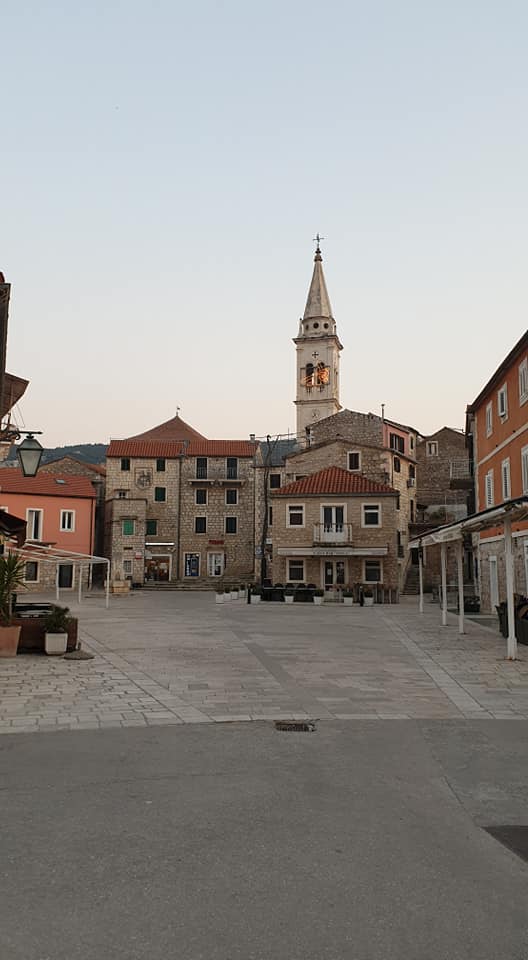
The main square of Jelsa tonight, which traditionally was the focal point of the procession, which has survived occupation by the Italian fascists in 1943, took place in the Sinai Desert in a refugee camp in Egypt in 1944, and took place in the godless Socialist years of Tito. You can learn more about that, and the procession in a previous article on TCN - 'Za Krizen' on Hvar Overcame Fascists, Tito, Sinai Desert, But Will It Beat Corona?
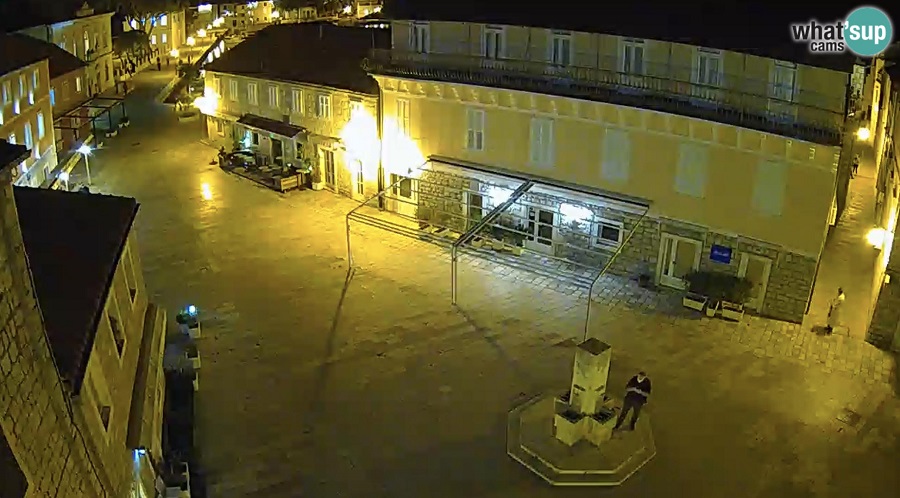
This is how Za Krizen looks in a normal year - the start of the Jelsa procession, one of six simultaneous processions which leave from Jelsa, Pitve, Vrisnik, Svirce, Vrbanj and Vrboska.
Clearly such a procession is NOT possible in the current climate. And this is NOT what Za Krizen 2020 will look like.
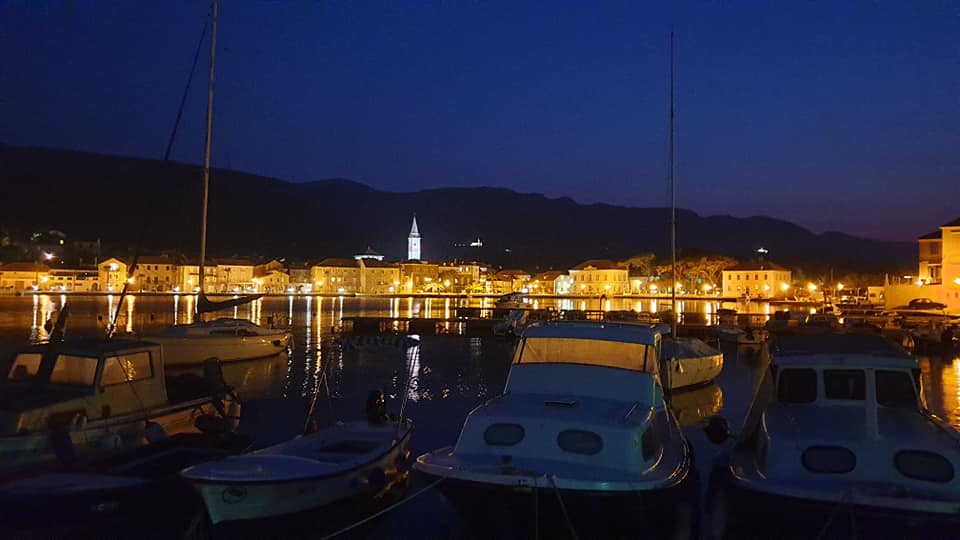
Jelsa tonight, as beautiful - and as empty - as I have ever seen it.
The sound of the church bells. They will fall silent tomorrow night until Sunday, as per the Holy Week tradition in Jelsa.
The discussion on whether or not to allow the procession to take place in some format has reached the very top echelons of the Croatian government. Health Minister Vili Beros, himself from Jelsa, stated that he was in favour of delaying the procession until September last week.
Clearly the idea of hundreds of people taking part was out of the question. Discussions ensued, and one suggestion was that each procession would be reduced to just five people - the crossbearer and four acolytes, a far cry from the 20 or so acolytes and the hundreds or thousands of pilgrims who walk through the night.
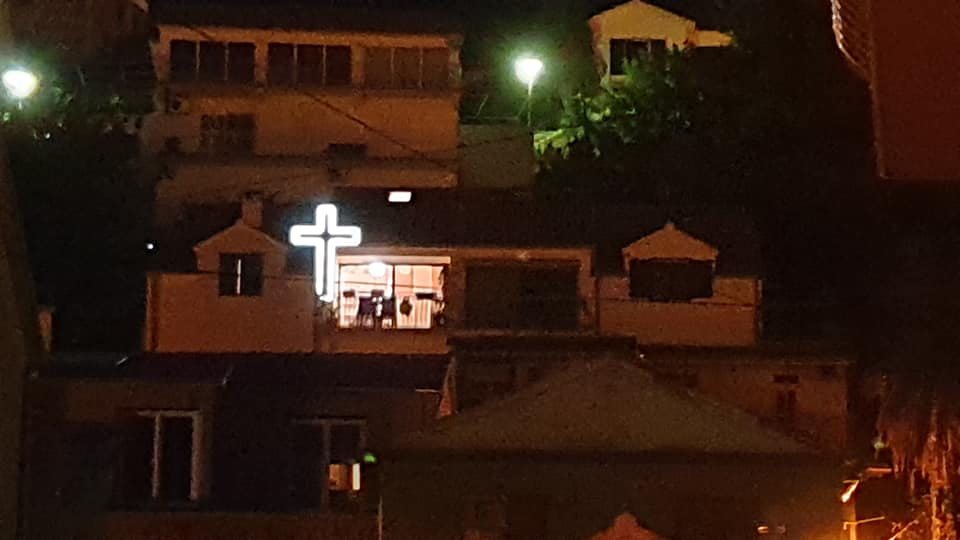
(A cross burns brightly outside the home of the Jelsa crossbearer, as per tradition)
My understanding is that the crossbearers asked for more acolytes to help them through the long night, and a decision was taken which involved PM Plenkovic (himself a Hvar man, who took part in Za Krizen back in 2017, as reported by TCN).
The final decision is that each procession will be allowed 15 participants (slightly more than the 12 allowed by the Italians in 1943), with five more singers following by car. Social distancing rules will be enforced.
And - and this will be VERY important to the millions of devout self-isolating Croatian Catholics here and in the diaspora - parts of Za Krizen 2020 will be available live from Jelsa, on the TCN Facebook page from 21:30 tomorrow night. At an incredibly important time of year for Croatians - Easter - the chance to see this religious tradition live from Hvar will no doubt give fortitude to many.
If all goes well, TCN will have a live feed from both the Jelsa church and the Jelsa main square from 21:30 tomorrow night until 08:00 on the morning of Good Friday. You can like the TCN Facebook page here, where the feed will appear.
I called the head of the Jelsa Civil Protection Headquarters today, and thereafter the head of Hvar police. Very productive discussions, in which I explained my socially distanced media coverage plans for tomorrow night. Both seemed fine but suggested that I request clearance from Jelsa Mayor Niksa Peronja. Mayor Peronja has just replied that I have clearance to report, so I will do the best I can to capture as much as I can of this tradition which means so much to the people of Hvar.
Last year, I managed to capture all six processions through the night.
I don't expect that level of access this year, but I will report back with the best I can do from a safe distance.
We will post the livestream link on TCN FB tomorrow night at 21:00.
And if you are wondering why Za Krizen 2020 is such a big deal, this is one of my favourite videos ever about Hvar traditions, which explains it all from the point of view of a crossbearer.



